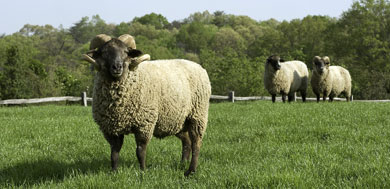I wasn’t surprised that the morning producer panel break-out session at the Buckeye Shepherds Symposium was standing room only: Farmers like to hear what other farmers are doing.
For an hour and a half (with no one fidgeting or checking his watch), we listened as Bruce Rickard of Knox County, Jeff and Kathy Bielek of Wayne County, Kevin Fowler of Ashtabula County, and Curt Cline of Athens County, shared insights on forages and pasture management that they’ve gleaned from their farms and flocks. I could’ve sat there for another hour and a half.
Trust me, among these four farms, they’ve tried just about everything. From tall grass grazing, strip grazing pure alfalfa stands, or putting beef cattle and sheep in grazing paddocks together, to letting sheep graze corn (and fielding phone call after phone call that your sheep are out), these sheep farmers are constantly trying, evaluating, assessing, failing, succeeding, and trying again.
And they’re willing to talk about it.
I see a lot of this sharing in grazing circles, and I applaud the Extension, Natural Resources Conservation Service and conservation district experts who help foster the conversations through grazing councils and pasture walks and grazing schools.
Curt Cline, who runs about 300 ewes and 85 replacement lambs on his family’s farms in Athens and Meigs counties, emphasized the point the best several times in his comments.
He had 4-H sheep projects in the 1980s, but admits he didn’t know too much about raising sheep. When he returned to the farm, he built a successful hay business (he has rare flat ground in southern Ohio), and ran some sheep on the side. Looking at the numbers one year, he realized the hay business was less profitable than the sheep that he was ignoring. So he sold the haying equipment and concentrated on the flock.
But he still didn’t really know what he was doing, when it came to grazing and feeding sheep. So he started talking to grazing experts — and we’ve got a lot of them in Ohio and Pennsylvania — and today calls them his “mentors,” and talks to them on a regular basis.
The grazing folks aren’t alone. There are no-till gurus, grain marketing whiz kids, corn kings, and farm market masters. There are dairy experts, maple syrup specialists and Christmas tree top guns.
No matter what field of agriculture you call home, there’s someone willing to listen and share advice. It may be your neighbor. It may be someone you’ve only heard of and you have to get out of your comfort zone and call them.
Unless you think you’re doing everything right, there’s some aspect of your farm that you need to improve. To try, evaluate, assess, fail, succeed and try again.
You don’t have to try to figure it out alone, but you do have to be willing to listen, and then “adapt, not adopt” (as Cline credits OSU Extension’s Jeff McCutcheon with saying) to your own farm.
Chance are, you have something to share, too.
By Susan Crowell
STAY INFORMED. SIGN UP!
Up-to-date agriculture news in your inbox!













